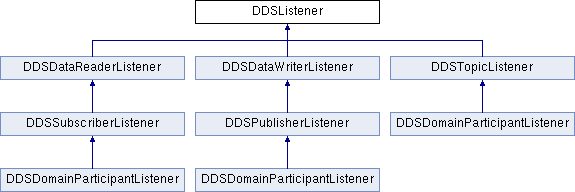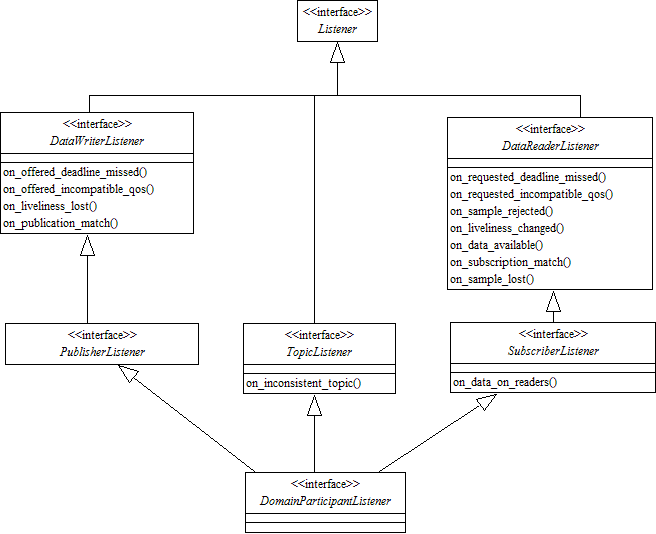<<interface>> Abstract base class for all Listener interfaces. More...

Detailed Description
<<interface>> Abstract base class for all Listener interfaces.
- Entity:
- DDSEntity
- QoS:
- QoS Policies
- Status:
- Status Kinds
All the supported kinds of concrete DDSListener interfaces (one per concrete DDSEntity type) derive from this root and add methods whose prototype depends on the concrete Listener.
Listeners provide a way for RTI Connext to asynchronously alert the application when there are relevant status changes.
Almost every application will have to implement listener interfaces.
Each dedicated listener presents a list of operations that correspond to the relevant communication status changes to which an application may respond.
The same DDSListener instance may be shared among multiple entities if you so desire. Consequently, the provided parameter contains a reference to the concerned DDSEntity.
Access to Plain Communication Status
The general mapping between the plain communication statuses (see Status Kinds) and the listeners' operations is as follows:
- For each communication status, there is a corresponding operation whose name is
on_<communication_status>(), which takes a parameter of type<communication_status>as listed in Status Kinds.
on_<communication_status>is available on the relevant DDSEntity as well as those that embed it, as expressed in the following figure:

- When the application attaches a listener on an entity, it must set a mask. The mask indicates to RTI Connext which operations are enabled within the listener (cf. operation DDSEntity set_listener() ).
- When a plain communication status changes, RTI Connext triggers the most specific relevant listener operation that is enabled. In case the most specific relevant listener operation corresponds to an application-installed 'nil' listener the operation will be considered handled by a NO-OP operation that does not reset the communication status.
This behavior allows the application to set a default behavior (e.g., in the listener associated with the DDSDomainParticipant) and to set dedicated behaviors only where needed.
Access to Read Communication Status
The two statuses related to data arrival are treated slightly differently. Since they constitute the core purpose of the Data Distribution Service, there is no need to provide a default mechanism (as is done for the plain communication statuses above).
The rule is as follows. Each time the read communication status changes:
- First, RTI Connext tries to trigger the DDSSubscriberListener::on_data_on_readers with a parameter of the related DDSSubscriber;
- If this does not succeed (there is no listener or the operation is not enabled), RTI Connext tries to trigger DDSDataReaderListener::on_data_available on all the related DDSDataReaderListener objects, with a parameter of the related DDSDataReader.
The rationale is that either the application is interested in relations among data arrivals and it must use the first option (and then get the corresponding DDSDataReader objects by calling DDSSubscriber::get_datareaders on the related DDSSubscriber and then get the data by calling FooDataReader::read or FooDataReader::take on the returned DDSDataReader objects), or it wants to treat each DDSDataReader independently and it may choose the second option (and then get the data by calling FooDataReader::read or FooDataReader::take on the related DDSDataReader).
Note that if DDSSubscriberListener::on_data_on_readers is called, RTI Connext will not try to call DDSDataReaderListener::on_data_available. However, an application can force a call to the DDSDataReader objects that have data by calling DDSSubscriber::notify_datareaders.
Operations Allowed in Listener Callbacks
The operations that are allowed in DDSListener callbacks depend on the DDS_ExclusiveAreaQosPolicy QoS policy of the DDSEntity to which the DDSListener is attached – or in the case of a DDSDataWriter of DDSDataReader listener, on the DDS_ExclusiveAreaQosPolicy QoS of the parent DDSPublisher or DDSSubscriber. For instance, the DDS_ExclusiveAreaQosPolicy settings of a DDSSubscriber will determine which operations are allowed within the callbacks of the listeners associated with all the DataReaders created through that DDSSubscriber.
Note: these restrictions do not apply to builtin topic listener callbacks.
Regardless of whether DDS_ExclusiveAreaQosPolicy::use_shared_exclusive_area is set to DDS_BOOLEAN_TRUE or DDS_BOOLEAN_FALSE, the following operations are not allowed:
- Within any listener callback, deleting the entity to which the DDSListener is attached
- Within a DDSTopic listener callback, any operations on any subscribers, readers, publishers or writers
An attempt to call a disallowed method from within a callback will result in DDS_RETCODE_ILLEGAL_OPERATION.
If DDS_ExclusiveAreaQosPolicy::use_shared_exclusive_area is set to DDS_BOOLEAN_FALSE, the setting which allows more concurrency among RTI Connext threads, the following are not allowed:
- Within any listener callback, creating any entity
- Within any listener callback, deleting any entity
- Within any listener callback, enabling any entity
- Within any listener callback, setting the QoS of any entities
- Within a DDSDataReader or DDSSubscriber listener callback, invoking any operation on any other DDSSubscriber or on any DDSDataReader belonging to another DDSSubscriber.
- Within a DDSDataReader or DDSSubscriber listener callback, invoking any operation on any DDSPublisher (or on any DDSDataWriter belonging to such a DDSPublisher) that has DDS_ExclusiveAreaQosPolicy::use_shared_exclusive_area set to DDS_BOOLEAN_TRUE.
- Within a DDSDataWriter of DDSPublisher listener callback, invoking any operation on another Publisher or on a DDSDataWriter belonging to another DDSPublisher.
- Within a DDSDataWriter of DDSPublisher listener callback, invoking any operation on any DDSSubscriber or DDSDataReader.
An attempt to call a disallowed method from within a callback will result in DDS_RETCODE_ILLEGAL_OPERATION.
The above limitations can be lifted by setting DDS_ExclusiveAreaQosPolicy::use_shared_exclusive_area to DDS_BOOLEAN_TRUE on the DDSPublisher or DDSSubscriber (or on the DDSPublisher/ DDSSubscriber of the DDSDataWriter/DDSDataReader) to which the listener is attached. However, the application will pay the cost of reduced concurrency between the affected publishers and subscribers.
- See Also
- EXCLUSIVE_AREA
- Status Kinds
- DDSWaitSet, DDSCondition